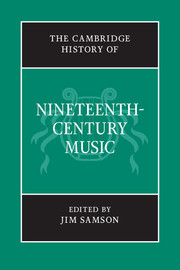Book contents
- Frontmatter
- Part One 1800–1850
- Part Two 1850–1900
- 11 Progress, modernity and the concept of an avant-garde
- 12 Music as ideal: the aesthetics of autonomy
- 13 The structures of musical life
- 14 Opera and music drama
- 15 Beethoven reception: the symphonic tradition
- 16 Words and music in Germany and France
- 17 Chamber music and piano
- 18 Choral culture and the regeneration of the organ
- 19 Music and social class
- 20 Nations and nationalism
- 21 Styles and languages around the turn of the century
- Chronology
- Institutions
- Personalia
- Index
- References
20 - Nations and nationalism
from Part Two - 1850–1900
Published online by Cambridge University Press: 28 March 2008
- Frontmatter
- Part One 1800–1850
- Part Two 1850–1900
- 11 Progress, modernity and the concept of an avant-garde
- 12 Music as ideal: the aesthetics of autonomy
- 13 The structures of musical life
- 14 Opera and music drama
- 15 Beethoven reception: the symphonic tradition
- 16 Words and music in Germany and France
- 17 Chamber music and piano
- 18 Choral culture and the regeneration of the organ
- 19 Music and social class
- 20 Nations and nationalism
- 21 Styles and languages around the turn of the century
- Chronology
- Institutions
- Personalia
- Index
- References
Summary
Nationalisms
The French Revolution brought into sharp focus a cluster of ideas about freedom and rights that had been bred in seventeenth-century England and nurtured in eighteenth-century France. Unsurprisingly, it is far from easy to disentangle these ideas – to be clear about causes and effects. Notions of freedom and rights were no doubt promoted by the mode of production of an emergent capitalism in the seventeenth century. But they were promoted too by the Protestant reformation and its influential ethos; and by the philosophical empiricism cultivated by English thinkers. How is one to define a relation between these levels? A (broadly) Marxist position claims that changes in the polity, as also in the cultural and intellectual domains, are invariably motivated by changes in the socio-economic base. Yet this is in competition with the claim (by, for example, Max Weber) that ideas can change the world. Then again, more recent critical theory takes refuge in dialectics, a seductive solution to the chicken and egg problem, but one that may on occasion amount to a failure of nerve. Whatever the underlying causality, it is clear that on a political level strengthening notions of popular sovereignty were given practical meaning and propaganda by the Revolution in France, as earlier by the American War of Independence. These events effectively inaugurated an age of revolution and of liberalism, though it should be noted that from the start liberalism involved a dimension of contractualism as well as of freedom.
- Type
- Chapter
- Information
- The Cambridge History of Nineteenth-Century Music , pp. 568 - 600Publisher: Cambridge University PressPrint publication year: 2001
References
- 4
- Cited by

